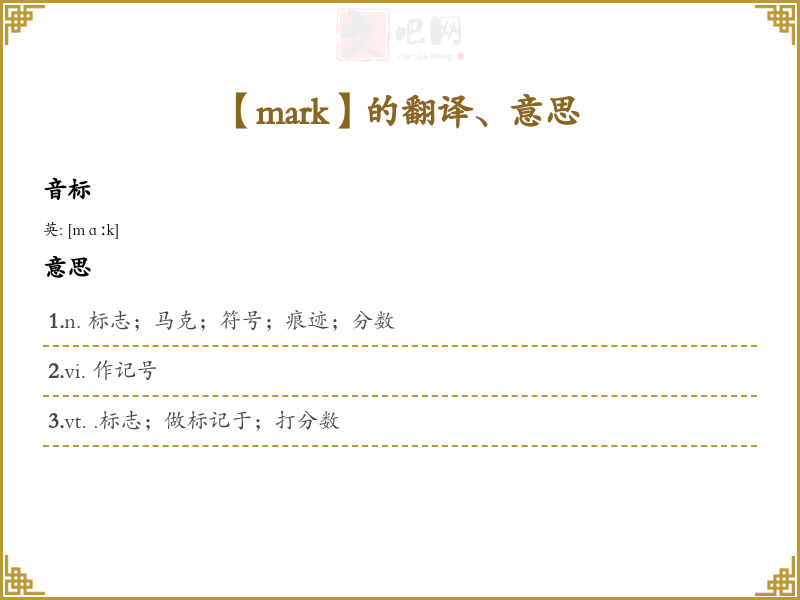【mark】的翻译、意思
时间: 2025-04-27 02:51:06
【mark】怎么读
英:[mɑːk]
【mark】是什么意思、字义解释
1. n. 标志;马克;符号;痕迹;分数
2. vi. 作记号
3. vt. .标志;做标记于;打分数
4. n. . 标志;做标记于;打分数
【mark】的详细解释
英文单词学*与分析:[mark]
1. 基本定义:
-
字面意思:
"Mark" 作为名词时,指一个符号或迹象;作为动词时,意味着标记、指明或注释。 -
词性:
名词 (n.) / 动词 (v.)
2. 词源与起源:
-
词源分析:
"Mark" 源自古英语 "mearc",意指“边界”或“界限”。其词根与德语 "Mark" 和荷兰语 "merk" 相近,都与“标记”或“界限”相关。 -
历史背景:
该词首次使用的记录可以追溯到公元前的古英语文献,通常用于指示地理或物理边界。 -
课本:
在**,"mark" 可能出现在初中或高中英语教材中,例如《牛津英语》或《新概念英语》。在美国,常见于小学至高中英语课本中。
3. 使用场景:
-
正式与非正式语境:
- 正式:在学术论文中,"mark" 用于指示数据或结果的显著性(e.g., "The results mark a significant change in the trend.")。
- 非正式:在日常交流中,"mark" 常用于谈论标记或注释(e.g., "Could you please mark the important points in the text?")。
-
特殊场合:
- 法律:在法律文件中,"mark" 可以指示特定条款或条件(e.g., "Please mark the areas of concern in the contract.")。
- 科学:在科学研究中,"mark" 可能用于表示实验标记或指标(e.g., "The researchers used a dye to mark the cells.")。
4. 示例句子:
-
Please mark your answers clearly.
请清楚地标记你的答案。 -
The teacher used a red pen to mark the mistakes.
老师用红笔标记错误。 -
The event will mark the beginning of a new era.
该**将标志着一个新时代的开始。 -
He marked the location on the map.
他在地图上标记了位置。 -
The test results mark a significant improvement.
测试结果标志着显著的改善。
*. She made a mark on the paper with her pen.
她用笔在纸上做了一个标记。
-
The mark of a true leader is their ability to inspire others.
真正领导者的标志是激励他人的能力。 -
The mark on his arm was a reminder of his childhood.
他手臂上的标记是他童年的回忆。 -
This achievement will mark a milestone in his career.
这一成就将标志着他职业生涯的一个里程碑。 -
The mark of excellence is what we strive for.
卓越的标志是我们努力追求的目标。
5. 同义词与反义词:
-
同义词:
- Sign - 通常指象征或指示的符号。
- Symbol - 更强调代表某种概念或思想的标记。
微小差异:Sign 通常用于指代更广泛的迹象或符号,而 Symbol 更倾向于文化或抽象的表示。
-
反义词:
- Erase - 意为删除或抹去。
- Ignore - 意为不注意或忽略。
区别:Erase 指完全抹去标记,而 Ignore 指选择不去注意某个标记或迹象。
. 学方法:
-
音标记忆法:
通过音标 /mɑrk/ 来记忆该词,可以联想“标记”的发音与其意义相对应。 -
词根记忆法:
了解 "mark" 的词根含义为“边界”或“界限”,可以帮助记忆。
7. 关联词汇:
- 常见关联词汇包括:
- marking (标记)
- marked (显著的)
- remark (评论)
- bookmark (书签)
- trademark (商标)
这些关联词汇常用于与 "mark" 相关的语境中,帮助加深对该词的理解与使用。
【mark】例句
1、[N-COUNT] A mark is a small area of something such as dirt that has accidentally got onto a surface or piece of clothing. 斑点
-
例:The dogs are always rubbing against the wall and making dirty marks.这些狗总是往墙上蹭,留下了点点污斑。
2、[V-T/V-I] If something marks a surface, or if the surface marks, the surface is damaged by marks or a mark. 玷污; 留下污痕
-
例:Leather overshoes were put on the horses' hooves to stop them from marking the turf.皮套子被套在了马蹄上,防止它们弄脏了跑马场。
3、[N-COUNT] A mark is a written or printed symbol, for example a letter of the alphabet. 记号
-
例:He made marks with a pencil.他用铅笔作了记号。
4、[V-T] If you mark something with a particular word or symbol, you write that word or symbol on it. 在…上作记号
-
例:The bank marks the cheque "certified."银行在支票上标有“保付”的字样。
-
例:Mark them with a symbol.用个记号把他们标出来。
5、[N-COUNT] A mark is a point that is given for a correct answer or for doing something well in an exam or competition. A mark can also be a written symbol such as a letter that indicates how good a student's or competitor's work or performance is. 分数
-
例:...a simple scoring device of marks out of 10, where "1" equates to "Very poor performance."…一个简单的十分制评分体系,其中1分相当于表现“很差”。
6、[N-PLURAL] If someone gets good or high marks for doing something, they have done it well. If they get poor or low marks, they have done it badly. 评价
-
例:You have to give her top marks for moral guts.你必须给她的道德勇气最高的评价。
7、[V-T] When a teacher marks a student's work, the teacher decides how good it is and writes a number or letter on it to indicate this opinion. 打分
-
例:He was marking essays in his small study.他正在他的小书房里批阅文章。
8、[N-UNCOUNT] marking 打分
-
例:For the rest of the lunch break I do my marking.在剩余的午休时间,我批改作业。
9、[N-COUNT] A particular mark is a particular number, point, or stage which has been reached or might be reached, especially a significant one. (重要的) 指标
-
例:Unemployment is rapidly approaching the one million mark.失业人数正迅速接近百万大关。
10、[N-COUNT] The mark of something is the characteristic feature that enables you to recognize it. 特征
-
例:The mark of a civilized society is that it looks after its weakest members.文明社会的特征是它关心最弱势群体。
11、[N-SING] If you say that a type of behaviour or an event is a mark of a particular quality, feeling, or situation, you mean it shows that that quality, feeling, or situation exists. 表示
-
例:It was a mark of his unfamiliarity with Hollywood that he didn't understand that an agent was paid out of his client's share.他不知道经纪人的报酬由客户支付,这就是他对好莱坞并不熟悉的表现。
12、[V-T] If something marks a place or position, it shows where something else is or where it used to be. 标明 (位置)
-
例:A huge crater marks the spot where the explosion happened.一个巨大的弹坑标明了爆炸发生的地点。
13、[V-T] An event that marks a particular stage or point is a sign that something different is about to happen. 标志 (转折点)
-
例:The announcement marks the end of an extraordinary period in European history.这个声明标志着欧洲历史上一个伟大时代的终结。
14、[V-T] If you do something to mark an event or occasion, you do it to show that you are aware of the importance of the event or occasion. 纪念
-
例:Hundreds of thousands of people took to the streets to mark the occasion.数十万人走上了街头纪念这一时刻。
15、[V-T] Something that marks someone as a particular type of person indicates that they are that type of person. 表明 (为某一种类的人)
-
例:Her opposition to abortion and feminism marks her as a convinced traditionalist.她对堕胎和女权主义的反对表明她是一个坚定的传统主义者。
16、[PHRASE] If someone or something leaves their mark or leaves a mark, they have a lasting effect on another person or thing. 留下深远的影响
-
例:Years of conditioning had left their mark on her, and she never felt inclined to talk to strange men.多年的熏陶给她留下了深远的影响,她从来不愿意和陌生男人说话。
17、[PHRASE] If you make your mark or make a mark, you become noticed or famous by doing something impressive or unusual. 获得名望
-
例:She made her mark in the film industry in the 1960s.20世纪60年代她在电影界颇有名望。
18、[PHRASE] If something such as a claim or estimate is wide of the mark, it is incorrect or inaccurate. 离谱
-
例:That comparison isn't as wide of the mark as it seems.那种比较不像看上去那么离谱。
